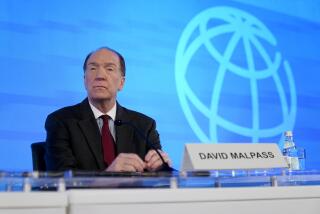Banking on Wolfowitz
- Share via
THERE WERE TWO gatherings of international leaders this month intended to address the terrible burden of poverty around the globe. One of them actually accomplished something.
The United Nations world summit in mid-September was a disappointment to nearly everyone involved. A meeting intended to spark major reforms at the U.N. and compel rich nations to make firmer commitments to fight poverty resulted only in vague statements and a few housekeeping changes. There was some danger that last weekend’s meeting of the World Bank and the International Monetary Fund in Washington would go the same route, but thanks to strong leadership, that didn’t happen.
Credit World Bank chief Paul D. Wolfowitz for helping to shame U.S. officials into signing a concrete agreement on debt relief for some of the world’s poorest nations. In July, the Group of 8, the world’s major industrial nations, agreed to forgive debt worth an estimated $40 billion from at least 18 poverty-stricken countries. But it was a vague promise with few details. Some European nations feared that the lost loan payments would hopelessly weaken international lenders such as the World Bank unless rich countries agreed to cover the losses.
Wolfowitz made repeated public calls for them to do just that, and last week the U.S. signed a joint letter with the other G-8 countries agreeing to do so. That puts the finishing touches on what may be the most significant step so far this decade in the fight against global poverty.
Wolfowitz’s nearly four-month tenure as leader of the World Bank has been largely quiet, which is surprising given the controversial nature of both the job and the man.
An architect of the Iraq war as a former deputy Defense secretary, Wolfowitz has a conservative ideology that some feared would stand in the way of good development policy. Yet even his liberal critics now find little fault with Wolfowitz, who has correctly shifted the bank’s focus to Africa and has spent most of his tenure talking to experts and African officials while studying World Bank operations to learn from its past mistakes.
But Wolfowitz’s most valuable contribution to date may simply be his role as a cheerleader. Amid an agency and a U.S. public that is cynical about the value of foreign aid, Wolfowitz has continually pointed out that things are changing for the better in Africa and that the world’s contributions are making a difference.
The World Bank’s list of failures is long and sordid. Projects intended to boost national economies and benefit the environment have done neither while leaving beneficiaries with crushing debts. Some have suggested that this record argues for getting the bank out of the business of development altogether.
Wolfowitz, to his credit, recognizes that this history shows only the need for the bank to come up with smarter policies. The alternative -- doing nothing while millions starve or die of curable diseases -- is unacceptable from any moral, economic or strategic viewpoint.
More to Read
Sign up for Essential California
The most important California stories and recommendations in your inbox every morning.
You may occasionally receive promotional content from the Los Angeles Times.













